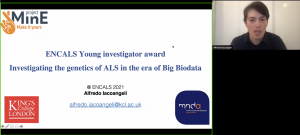
Alfredo presenting his work during the last day of the virtual ENCALS Meeting, Friday May 14th.
 Alfredo Iacoangeli is the winner of the ENCALS Young Investigator Award 2021.
Alfredo Iacoangeli is the winner of the ENCALS Young Investigator Award 2021.
Prof. Ammar Al-Chalabi, chair of the ENCALS Award Committee, congratulated Alfredo during the virtual ENCALS Meeting on Friday, May 14th 2021.
Research background:
Dr Iacoangeli’s background includes BSc and MSc degrees in biophysics at “Sapienza” University of Rome and a PhD in bioinformatics graduating with honours. He now chairs the Data Infrastructure Working Group for Project MinE, and he is the Bioinformatics lead of a joint program between the Department of Basic and Clinical Neuroscience and the Health Informatics Unit of the Institute of Psychiatry, Psychology & Neuroscience at King’s College London.
The aims of his program are threefold:
- The development of a high throughput gene, environment and epigenetics database and analysis system for international MND/ALS research;
- The use of large multi-omics datasets to identify subgroups MND/ALS patients with homogeneous disease causes and clinical phenotypes, and to gain new insights into the disease pathogenesis;
- The development of Machine learning and Bioinformatics methods for the analysis of multi-omics data.
Despite his early career stage, he has already established a research programme in ALS bioinformatics, raising sufficient funds himself to become an independent researcher with several staff. The high regard in which he is held is evident, for example, by his invitation to be a speaker at several international conferences such as the Biodata World Congress 2017 (Hinxton, UK), the Virtual NGS & Single Cell Analysis Congress 2020 and the Festival of Genomics 2020 and 2021 (London, UK), and to take part in MND/ALS scientific committees for charities and other organizations.
Dr Iacoangeli is not only an outstanding early career researcher, but he is also a passionate and competent supervisor and teacher. During his time with us he has supervised over 15 MSc students in statistical genetics, neuroscience, and data science, and medical trainees, one of whom won the Foundation prize. He has been a guest lecturer in many MSc courses at King’s College London and is now the lead for the Basic and Advanced Bioinformatics modules of the MSc in Genomic Medicine and the MSc in Applied Statistical Modelling & Health Informatics at King’s College London.
Professor Ammar Al-Chalabi
Research interests and achievements:
When I started my university studies in the early 2000, the Human Genome Project had just assembled the first “complete” human genome and the high-throughput technology revolution was moving its first steps promising that sequencing whole-genomes was going to shortly be a common part of genetic
studies. That promise was maintained, and we now have available unprecedented amounts of multi-omics data to study the basis of human diseases. I believe we are living in one of the most amazing times for research and I am particularly passionate about developing novel approaches to exploit this unique source
of information. My research focusses on the use of state-of-the-art bioinformatics, statistical and Artificial Intelligence methodologies and large multi-omics datasets to investigate the relationship between genotype, environment and disease.
In my ALS research career,
- I have used novel bioinformatics methodologies to accurately solve repetitive regions of the human genome and demonstrate, for example, that intermediate C9orf72 expansions (24-30 repeat long), previously considered benign, are actually associated with the risk of ALS and can potentially account for about 1% of all patients of European ancestry. Furthermore, I have shown that the telomeres of ALS patients are abnormally long, suggesting new avenue of research including their use as diagnostic and prognostic biomarkers.
- I have used the large amounts of genomic data from different populations in a cross-ancestry study, under the assumption that such an approach might further confound population specific effects while highlighting fundamental disease mechanisms commons to all ALS patients. This approach has led to the recent discovery of new ALS risk genes, including ACSL5.
- Finally, using a multi-omics approach to study the role of SCFD1 in ALS, I have shown that its expression Quantitative Trait Loci increase the risk of ALS and have a strong effect on the patient survival. Currently, I am focusing on the use of Artificial Intelligence to increase our understanding of the genetic causes of ALS.
The award
The ENCALS Young Investigator Award was designed to recognize the brightest and best young scientists in ALS, and is given for outstanding research. It is judged by the ENCALS Award Committee, an international panel of experts. Criteria include any or all of novelty, challenge to existing ideas about ALS, results with patient benefit, and impact on our understanding of ALS.
Earlier recipients of the ENCALS young investigator award were:
- Jan Veldink from University Medical Centre Utrecht, the Netherlands in 2011
- Martin Turner of Oxford University, UK in 2012
- Luc Dupuis from the University of Strasbourg in France in 2013
- Ashley Jones from Kings College London in 2014
- Edor Kabashi, ICM, Paris in 2015
- Francesco Pagnini, Catholic University of Milan in 2016
- Jonathan Cooper-Knock, the Sheffield Institute for Translational Neuroscience in 2017
- Russell McLaughlin from Trinity College Dublin in 2018
- Axel Freischmidt from Ulm University in 2019
- Tatyana Shelkovnikova, the Medicines Discovery Institute, in 2020
All of these high profile researchers have been continuously dedicated to ALS research and strengthen the ENCALS network with their involvement in international research collaboration.